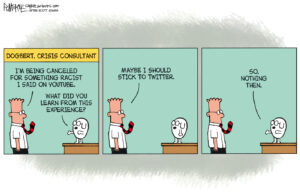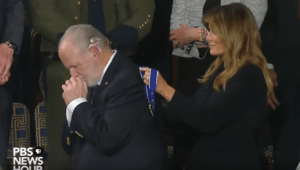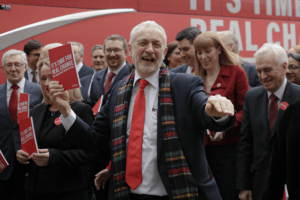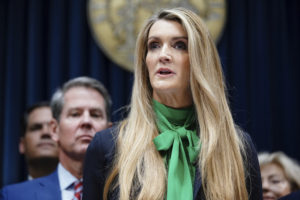An Absurd Debate
One of the most predictable arguments is also one of the most useless: that politics come down to a choice between being for "big government" or "small government." Those catchphrases explain remarkably little about what politicians do, or what voters want.HARBERT, Mich. — One of the most predictable arguments is also one of the most useless: that politics come down to a choice between being for “big government” or “small government.” Those catchphrases explain remarkably little about what politicians do, or what voters want.
Could there be any more of a big-government endeavor than the invasion and reordering of Iraq, pursued by a president from the party of small government? Do the domestic spying programs have anything to do with a small-government agenda?
The big-government framework was almost entirely irrelevant to last week’s debate in the House over the farm program. Many farm-state conservatives are resolutely opposed to “welfare” programs but passionately favor big-government subsidies to farmers, even rich ones.
In the meantime, the coalition against excessive government entanglement in the farm economy crisscrossed all ideological boundaries, running from Rep. Jeff Flake, R-Ariz., to Sen. Richard Lugar, R-Ind., to Rep. Ron Kind, D-Wis.
Kind’s amendment to reform the farm program attracted an admirable band of supporters, including some of the most liberal and most conservative members of the House. Yet it was overwhelmingly voted down because a slew of farm-state conservatives uncharacteristically joined the Democratic leadership in opposing it.
Rep. Robert Goodlatte, R-Va., said Kind’s proposal “rips out the safety net for American farmers and ranchers.” At last, a safety net many conservatives love. Democratic leaders, for their part, opposed Kind because they wanted an electoral safety net for their vulnerable members from farming districts.
The same inconsistencies apply even to that dreaded concept, “socialized medicine.” Last week, the American auto companies opened what will be difficult negotiations with the United Auto Workers union. The toughest issue will be healthcare. General Motors paid $4.8 billion for healthcare last year, including $3 billion for retirees. Is it any wonder that the good capitalists at GM and the other car companies would love the government to pick up some of these costs?
“There’s been an enormous paradigm shift in the business community,” says Gov. Jennifer Granholm, a Democrat who has led Michigan during the crisis in the auto industry. Healthcare, she said, has “gone from being a moral issue to being an economic issue,” meaning that business leaders who once had objections in principle to government-led healthcare reform now have a powerful interest in making it happen.
Shrewd industrialists who love the free enterprise system have noticed how “countries that have big-government healthcare” are at a competitive advantage, Granholm said in a telephone interview, and “they’re asking government to help them out.”
The argument about “big” versus “small” government rages in state politics around the country, but the fights closer to the ground tend to be less ideological. Unlike the federal government, most states face strict limits on their ability to run deficits, so the relationship between the taxes that citizens must pay and the government programs that voters want is much more explicit.
“For us, it’s either slash education, higher education, healthcare for seniors or for the disabled, or let people out of prison,” said Granholm, who is in the midst of a battle with Republicans who control the state Senate over whether to raise taxes — and which taxes to raise — to cover a state deficit.
Posturing on taxes will probably continue until very close to the state’s fall budget deadline. But because the trade-offs between taxes and spending are clear, politicians can’t afford to be too rhetorical. For example, Granholm has said the state could save as much as $100 million a year in prison costs by making some nonviolent felonies misdemeanors and changing sentencing guidelines so the least dangerous criminals could get shorter sentences.
It’s the sort of choice that states all over the country will have to face because criminal sentences were ratcheted up almost everywhere in the 1990s. This is a particularly nice example of where the labels fail: Is it “conservative” to want to cut prison costs, or “liberal” to want to cut sentences? Where, exactly, does big government come into this picture?
Granholm argues that the United States is “never going to be the cheapest place to do business,” in part because of its high labor and environmental standards relative to many of the emerging economies. She suggests that improving the country’s competitive position will require “investing in education, higher education and healthcare.”
Is that big government? Does it matter? “Let’s put all that old stuff aside,” Granholm says. Given how irrelevant the old debate was anyway, why not?
E.J. Dionne’s e-mail address is postchat(at)aol.com.
© 2007, Washington Post Writers Group
Your support matters…Independent journalism is under threat and overshadowed by heavily funded mainstream media.
You can help level the playing field. Become a member.
Your tax-deductible contribution keeps us digging beneath the headlines to give you thought-provoking, investigative reporting and analysis that unearths what's really happening- without compromise.
Give today to support our courageous, independent journalists.






You need to be a supporter to comment.
There are currently no responses to this article.
Be the first to respond.